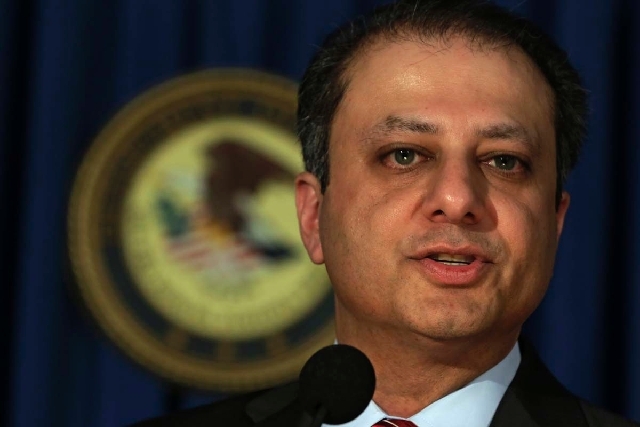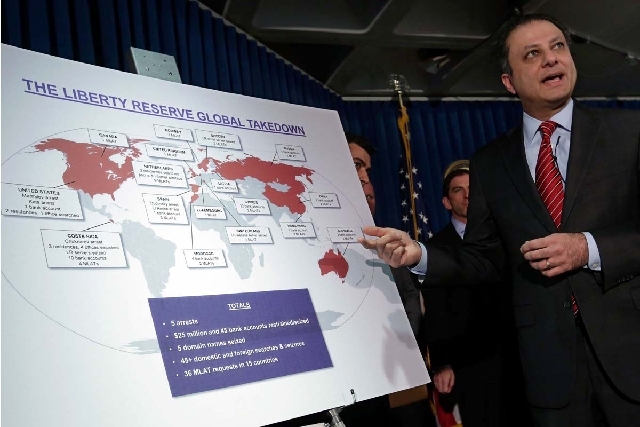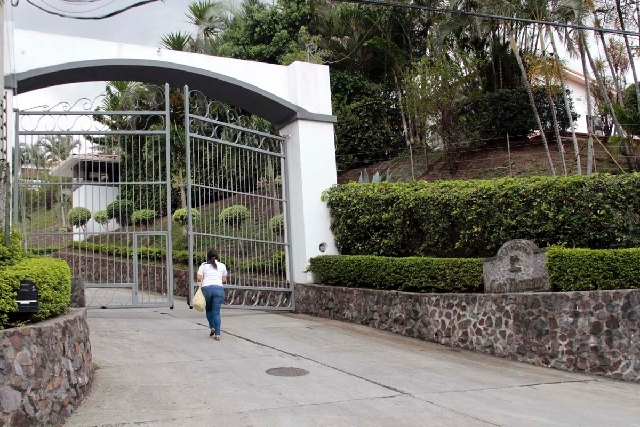Seven charged in $6 billion online money laundering case
NEW YORK — Calling it perhaps the biggest money laundering scheme in U.S. history, federal prosecutors charged seven people Tuesday with running what amounted to an online, underworld bank that handled $6 billion for drug dealers, child pornographers, identity thieves and other criminals around the globe.
The case was aimed at Liberty Reserve, a currency transfer and payment processing company based in Costa Rica that authorities say allowed customers to move money anonymously from one account to another via the Internet with almost no questions asked.
U.S. officials said the enterprise was staggering in scope: Over roughly seven years, Liberty Reserve processed 55 million illicit transactions worldwide for 1 million users, including 200,000 in the U.S.
The network “became the bank of choice for the criminal underworld,” U.S. Attorney Preet Bharara said in announcing the unsealing of an indictment against the defendants, including Liberty Revenue founder Arthur Budovsky, an American who renounced his U.S. citizenship after deciding to set up in Costa Rica.
Liberty Reserve allowed users to open accounts using fictitious names, including “Russian Hacker” and “Hacker Account.” An undercover investigator was able to register using the name “Joe Bogus” and the address “123 Fake Main Street” in “Completely Made Up City, New York,” and then conduct transactions he recorded as “ATM skimming network” and “for the cocaine.”
“The coin of the realm was anonymity,” Bharara said. “It was the opposite of a know-your-customer policy.”
The network charged a 1 percent fee on transactions through middlemen known as exchangers, who converted real currency into virtual funds and then back into cash.
In the indictment, prosecutors called the network “one of the principal means by which cyber criminals around the world distribute, store and launder proceeds of their illegal activity ... including credit card fraud, identity theft, investment fraud, computer hacking, child pornography and narcotics trafficking.”
Bharara said it was possibly “the largest international money laundering case ever brought by the United States.”
Budovsky and another defendant, identified as Azzeddine el Amine, were arrested Friday at a Madrid airport while trying to return to Costa Rica, according to a Spanish court official, who spoke on condition of anonymity because court policy forbids him from speaking on the record. They were ordered jailed while they await a hearing on extradition to the U.S.
Two other men, including Liberty Reserve co-founder Vladimir Kats, were arrested last week in New York City. There was no public record of their arraignments on Friday night, and there was no immediate response to phone messages left Tuesday with their attorneys.
Of the three remaining defendants, one was in custody in Costa Rica and the others were at large there.
A notice pasted across Liberty Reserve’s website Tuesday morning said the domain “has been seized by the United States Global Illicit Financial Team.” Attempts to reach Liberty Reserve by phone and email were unsuccessful.
Budovsky and Kats have previous convictions on state charges related to an unlicensed money transmitting business, according to court papers. After that case, they decided to move their operation to Costa Rica, the papers said.
In an online chat captured by law enforcement, Kats admitted Liberty Reserve was illegal and noted that authorities in the United States knew it was “a money-laundering operation that hackers use.”
While authorities described Liberty Reserve as being rife with criminals, the site’s ease of use, low fees and irreversible transactions that deterred fraud also attracted legitimate users.
Mitchell Rossetti, whose Houston-based ePayCards.com was one of several mainstream merchants that accepted Liberty Reserve’s online-only currency, said his business still had about $28,000 tied up in Liberty Reserve accounts.
“The irony of this is I went to them because of the security,” Rossetti said. “All sales were final.”
He acknowledged that the currency was being used by scammers but said Liberty Reserve funds were just like any other currency: “The U.S. dollar can be donated to a church or it can pay a prostitute.”
Liberty Reserve appears to have played an important role in laundering proceeds from the recent theft of some $45 million from two Middle Eastern banks, according to documents made public by U.S. authorities earlier this month. In that scheme, thieves stole debit card information and then used it to drain cash from thousands of ATMs around the world in a matter of hours.
As part of the Liberty Reserve investigation, authorities raided 14 places in Panama, Switzerland, the U.S., Sweden and Costa Rica. In Costa Rica, investigators recovered five luxury cars, including three Rolls-Royces. Bharara said authorities also seized Liberty’s computer servers in Costa Rica and Switzerland.
The businesses that were raided in Costa Rica on Friday as part of the investigation into Liberty Reserve are dedicated to Web hosting services, website development and Internet business consulting.
In Costa Rica, all online businesses are legal and there aren’t any laws regulating them, so the country has been attracting entrepreneurs setting up Internet-based companies that do everything from e-commerce to gambling banned in other countries.
———
Satter reported from London. Alan Clendenning and Jorge Sainz in Madrid and Javier Cordoba in San Jose, Costa Rica, contributed to this report.
























